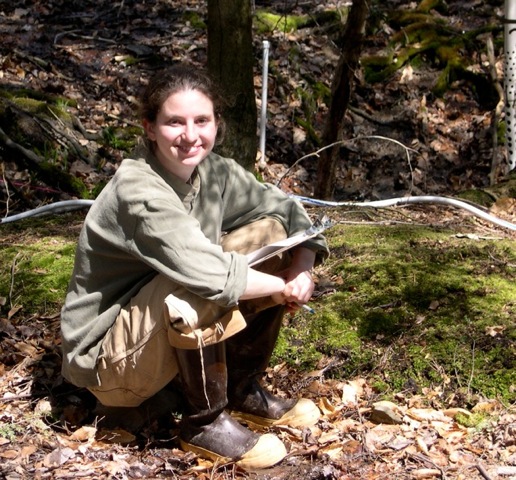16 September 2010
Earth scientist heads for stint as radio reporter
Posted by koneil
About to take on a new identity as a radio reporter in Colorado, soil ecologist Marissa Weiss will keep TPS readers posted on what it’s like to jump suddenly (albeit temporarily) from science to journalism. Marissa is AGU’s 2010 Mass Media Fellow. Here’s her introductory post:
After spending six years in a soil ecology lab, I am about to trade a microcentrifuge for a microphone. About two weeks ago, I defended my Ph.D. thesis in ecology at Cornell University, in Ithaca, New York. Next week, I will travel to Greeley, Colorado, and spend 10 weeks at KUNC, a public radio station as an AGU-sponsored AAAS Science and Technology Mass Media Fellow. (This program was described in a recent blog post.)
For my Ph.D., I studied forest soils from the northeastern United States. As a consequence of long-term nitrogen addition experiments, soil decomposition decreased in the soils I studied, because of a decline in the microbial community mediating decomposition.
Early in graduate school, after several awkward and failed attempts to describe my thesis research to friends and family who had not made a career of contemplating soil carbon, I realized that science communication is challenging and necessary. Whether my goal is to apply my research to policy and management, to report back to stakeholders funding my research, or to maintain a close connection with my community outside of graduate school, I seriously needed some tools and training to help.
A fellow graduate student and I collaborated with several mentors to develop a communication class for science graduate students. In the classes that followed, we learned the basic values that make science newsworthy: new, unexpected discoveries, science that captures our imagination by transporting us to a different part of the world or universe, findings that improve our everyday lives, and science that is relevant to other topics already in the news (the Gulf oil spill is a recent example) are all newsworthy. Then we learned to turn our news into a story.
I expected that once the class was over, I would be trained to communicate, and would get back to my research. Instead, at the end of the class, I knew what I needed to do to communicate my research, but deftly crafting scientific topics into stories with general appeal would require more practice and experience. While some may argue that research scientists don’t really need more than basic communication training because relatively little of our time is spent doing public outreach, I think I am likely to allocate more time to public outreach if I have the training and ability to do it well. I applied to the AAAS Science and Technology Mass Media Fellowship program to get that additional practice and experience turning scientific topics into compelling stories.
At KUNC, I am told, I will be welcomed into the newsroom, given some introductory training, and then will be set free with a microphone, digital audio recorder, and news assignments. I have experience with audio recording and editing, but this will be my first attempt at science journalism. I am excited to talk to scientists and citizens, to listen, and to take on the challenge of conveying what I have heard to the KUNC audience.
I am nervous because I am a novice science-to-story writer; I don’t yet have the experience to know when I am on target or when I have missed the mark. I will have mentors and editors to help with this, and I am eager to learn from them. My second uncertainty is about time: I think of myself as a thorough and deliberate worker, but I am not generally speedy. I expect to do some projects with daily deadlines and some with weekly deadlines. While deadlines help keep me productive, I will be challenged to do good work fast.
I will contribute to this blog while at KUNC, and over the coming 10 weeks, I am going to ponder these questions: What are some challenges to “good” science coverage in the media? (Good meaning accurate, comprehensive, interesting, and timely.) When and why is it hard for scientists to talk to the media? When and why is it hard for the media to talk to scientists?
I hope to also learn from examples of effective exchanges between scientists and the press as well as my setbacks and stumbles along the way.
— Marissa Weiss, AGU Mass Media Fellow



 The Plainspoken Scientist is the science communication blog of AGU’s Sharing Science program. With this blog, we wish to showcase creative and effective science communication via multiple mediums and modes.
The Plainspoken Scientist is the science communication blog of AGU’s Sharing Science program. With this blog, we wish to showcase creative and effective science communication via multiple mediums and modes.
[…] Earth scientist heads for stint as radio reporter […]